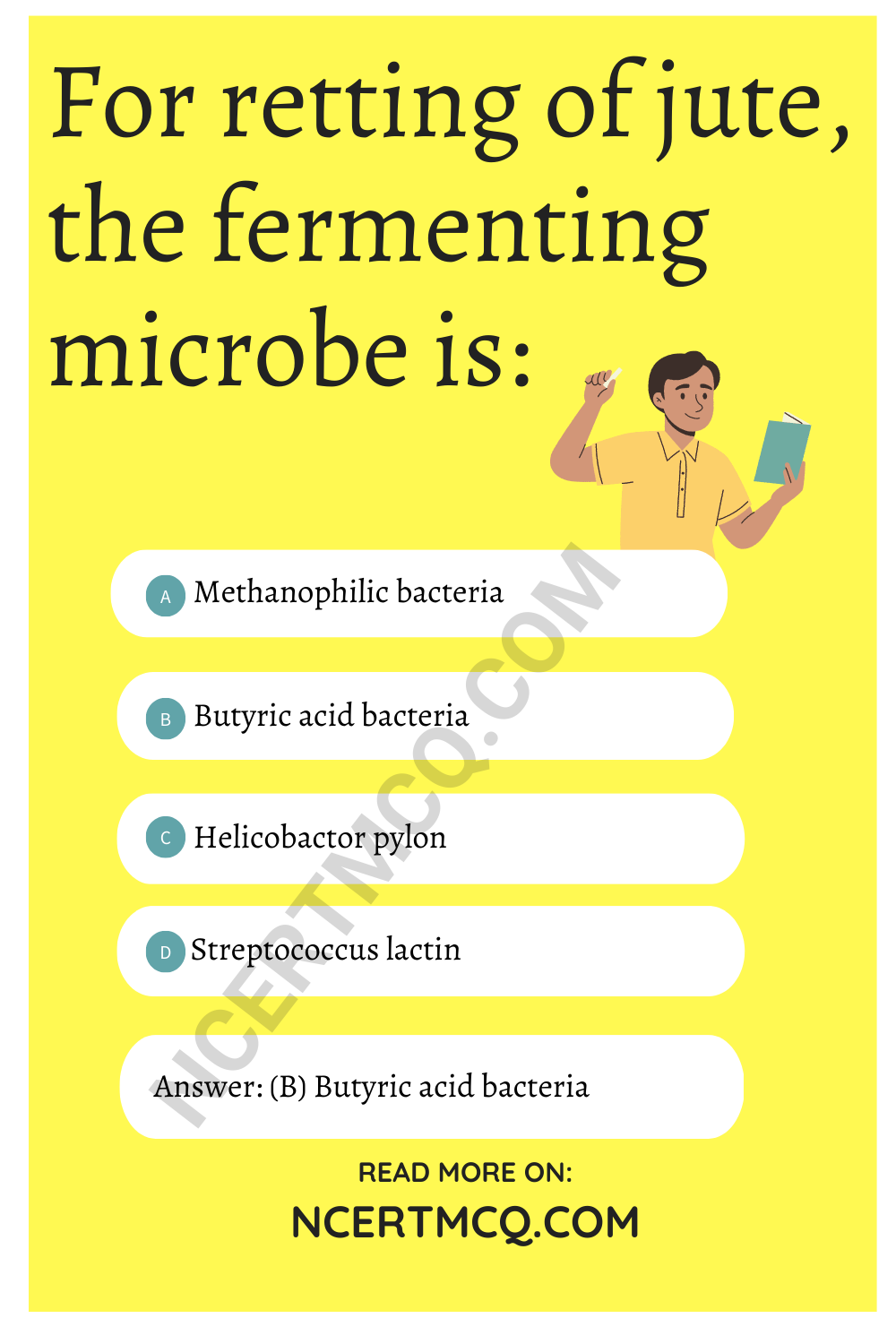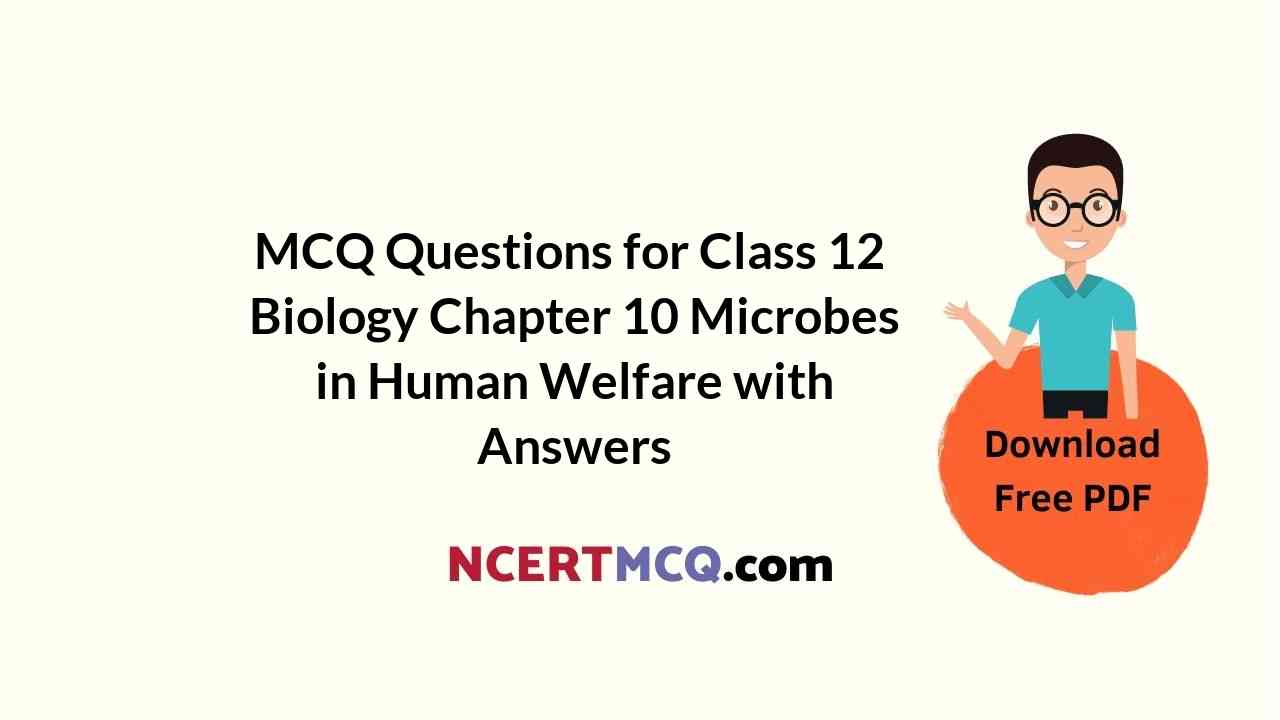Check the below NCERT MCQ Questions for Class 12 Biology Chapter 10 Microbes in Human Welfare with Answers Pdf free download. MCQ Questions for Class 12 Biology with Answers were prepared based on the latest exam pattern. We have provided Microbes in Human Welfare Class 12 Biology MCQs Questions with Answers to help students understand the concept very well.
Class 12 Biology Chapter 10 MCQ With Answers
Biology Class 12 Chapter 10 MCQs On Microbes in Human Welfare
Microbes In Human Welfare MCQ Question 1.
Bacillus thuringiensis (Bt) strains have been used for designing novel:
(a) Bio-metallurigcal techniques
(b) Bio-mineralization process
(c) Bio-insecticidal plants
(d) Bio-fertilizers
Answer
Answer: (c) Bio-insecticidal plants
Microbes In Human Welfare Class 12 MCQ Question 2.
Streptococcus is used in the preparation of:
(a) Wine
(b) Idli
(c) Paneer
(d) Bread
Answer
Answer: (c) Paneer

MCQ On Microbes In Human Welfare Question 3.
Nif gene occurs in:
(a) Peiiicillium
(b) Rhizobium
(c) Aspergillus
(d) Streptococcus
Answer
Answer: (b) Rhizobium
Microbes In Human Welfare MCQ With Answers Question 4.
Azoila has symbiotic relationship with:
(a) Chlotfila
(b) Anabaena
(c) Nostoc
(d) Tolypothrix
Answer
Answer: (b) Anabaena
MCQ On Microbes In Human Welfare Class 12 Question 5.
Term antibiotic was first used by :
(a) Flemming
(b) Pasteur
(c) Waksman
(d) Lister
Answer
Answer: (c) Waksman
Microbes In Human Welfare Class 12 MCQ Questions Question 6.
A free living anaerobic nitrogen fixing bacterium is:
(a) Rhizobium
(b) Streptococcus
(c) Azotobactor
(d) Clostridium
Answer
Answer: (d) Clostridium
Microbes In Human Welfare MCQs Question 7.
Citric acid is produced by:
(a) Rhizopus
(b) Mucor
(c) Aspergillus
(d) Saccharomyces
Answer
Answer: (a) Rhizopus
MCQs Of Biology Class 12 Chapter 10 Question 8.
In nostoc, enzyme nitrogenase occurs in :
(a) Vegetative cells
(b) Heterocysts
(c) Both (a) and (b)
(d) Only in hormogones
Answer
Answer: (c) Both (a) and (b)
Class 12 Biology Chapter 10 MCQ Question 9.
Usnic acid is an antibiotic obtained from :
(a) Fungi
(b) Bacteria
(c) Lichens
(d) Algae
Answer
Answer: (c) Lichens
MCQ Of Microbes In Human Welfare Question 10.
By anobacteria are useful biofertilizers in the; field of:
(a) Wheat
(b) Maize
(c) Rice
(d) Sugarcane
Answer
Answer: (c) Rice
MCQs On Microbes In Human Welfare Question 11.
Streptomycin is produced by:
(a) By Streptomyces Scoleus
(b) By Streptomyces fradiae
(c) By Streptomyces venezueleae
(d) By Streptomyces griseus
Answer
Answer: (d) By Streptomyces griseus
MCQ Questions On Microbes In Human Welfare Question 12.
Antibiotics are:
(a) Medicines
(b) Toxin
(c) Plants
(d) Syrups
Answer
Answer: (a) Medicines
MCQ Microbes In Human Welfare Question 13.
A free-living aerobic and non-photosynthetic nitrogen fixing bacterium is:
(a) Anabaena
(b) Clostridium
(c) Azotobactor
(d) Rhizobium
Answer
Answer: (c) Azotobactor
MCQ Of Chapter 10 Biology Class 12 Question 14.
For retting of jute, the fermenting microbe is:
(a) Methanophilic bacteria
(b) Butyric acid bacteria
(c) Helicobactor pylon
(d) Streptococcus lactin
Answer
Answer: (b) Butyric acid bacteria

We hope the given NCERT MCQ Questions for Class 12 Biology Chapter 10 Microbes in Human Welfare with Answers Pdf free download will help you. If you have any queries regarding Microbes in Human Welfare CBSE Class 12 Biology MCQs Multiple Choice Questions with Answers, drop a comment below and we will get back to you soon.
Class 12 Biology MCQ:
- Reproduction in Organisms Class 12 MCQ
- Sexual Reproduction in Flowering Plants Class 12 MCQ
- Human Reproduction Class 12 MCQ
- Reproductive Health Class 12 MCQ
- Principles of Inheritance and Variation Class 12 MCQ
- Molecular Basis of Inheritance Class 12 MCQ
- Evolution Class 12 MCQ
- Human Health and Disease Class 12 MCQ
- Strategies for Enhancement in Food Production Class 12 MCQ
- Microbes in Human Welfare Class 12 MCQ
- Biotechnology: Principles and Processes Class 12 MCQ
- Biotechnology and its Applications Class 12 MCQ
- Organisms and Populations Class 12 MCQ
- Ecosystem Class 12 MCQ
- Environmental Issues Class 12 MCQ
